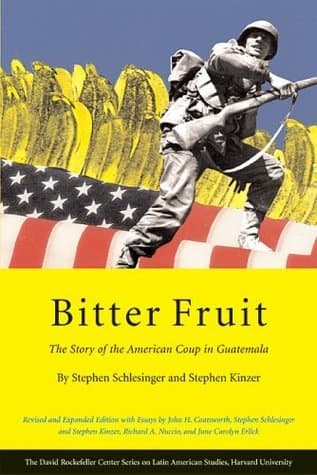
Book Review Summary: Bitter Fruit: The Story of the American Coup in Guatemala
Introduction
"Bitter Fruit: The Story of the American Coup in Guatemala" by Stephen C. Schlesinger is a comprehensive and insightful account of the CIA operation to overthrow the democratically elected government of Jacobo Arbenz in Guatemala in 1954. First published in 1982, this book has become a classic, shedding light on the relationship between the United States and the Third World. The authors make extensive use of U.S. government documents and interviews with former CIA and other officials, providing a warning about the consequences of American abuse of power. This article will delve into the book's content, author, and readers' opinions, highlighting the key points that make it a must-read.
About Stephen C. Schlesinger
Stephen C. Schlesinger is an author, historian, and journalist who has written extensively on U.S. foreign policy and Latin America. He has served as a foreign correspondent for The New York Times and has held positions at the Council on Foreign Relations and the Center for International Policy. Schlesinger's work often focuses on the intersection of politics, economics, and social issues in Latin America, providing readers with a deeper understanding of the region's complex history.
Analysis of Views
- The Role of American Capitalism in Latin America: Many readers found the book to be a revelation, exposing how American capitalism can lead to coups and the installation of dictators in Latin America. They argue that these actions contribute to the immigration problem in the region, as people flee from countries where their governments have been overthrown or oppressed by foreign powers.
- The Vicious Depths of American Foreign Policy: The book is widely regarded as a required reading for Americans, as it sheds light on the vicious and often silly depths of their government's foreign policy. Readers are shocked by the extent to which the United States will go to perpetuate its interests, even if it means undermining democracy and freedom.
- United Fruit Company's Influence: The United Fruit Company's role in triggering the coup is a central theme in the book. Readers are struck by how this predatory foreign company manipulated U.S. policy-makers, using false threats and propaganda to create a fake uprising. They argue that such actions undermine sovereignty and expose the hypocrisy of American claims to support democracy and freedom.
- Understanding Guatemala's Long Armed Conflict: Many readers found the book to be an essential resource for understanding the origins of Guatemala's long-standing armed conflict. It provides a comprehensive account of the American role in Guatemala and offers insights into current attitudes and opinions in Latin America about work, big international companies, and America.
- Balanced Perspective: Some readers appreciate the book's balanced perspective, which presents both sides of the conflict without bias. They find that it offers a nuanced understanding of the complexities involved in Guatemala's history, allowing them to better grasp the motivations and nuances of key players involved in the coup.
Reasons for Recommendation
- Comprehensive Account: "Bitter Fruit" provides a comprehensive account of the American coup in Guatemala, offering readers a deep understanding of the events, their consequences, and the complexities involved. It is a valuable resource for anyone interested in U.S. foreign policy, Cold War history, or Latin American politics.
- Well-Researched and Accessible: The authors' extensive use of U.S. government documents and interviews with former officials makes "Bitter Fruit" a well-researched book that is accessible to both experts and general readers. It offers a compelling narrative that engages readers from start to finish.
- Important Historical Lessons: The book serves as an important reminder of historical lessons about American interventionism and its impact on global politics. It highlights how such actions can lead to long-lasting consequences, including decades-long conflicts and human suffering. By reading "Bitter Fruit," readers can gain valuable insights into these lessons and reflect on their implications for current foreign policy debates.
Conclusion
"Bitter Fruit: The Story of the American Coup in Guatemala" by Stephen C. Schlesinger is a must-read book that provides a comprehensive account of the CIA operation to overthrow the democratically elected government of Jacobo Arbenz in 1954. It delves into the complexities of U.S.-Latin American relations, exposing the vicious depths of American foreign policy and shedding light on the role of corporate interests in shaping global events. With its well-researched narrative and balanced perspective, it offers readers a valuable resource for understanding historical events and their implications for contemporary politics. Whether you are an expert or a general reader, "Bitter Fruit" is an essential read that provides important historical lessons about power, corruption, and the consequences of American interventionism.